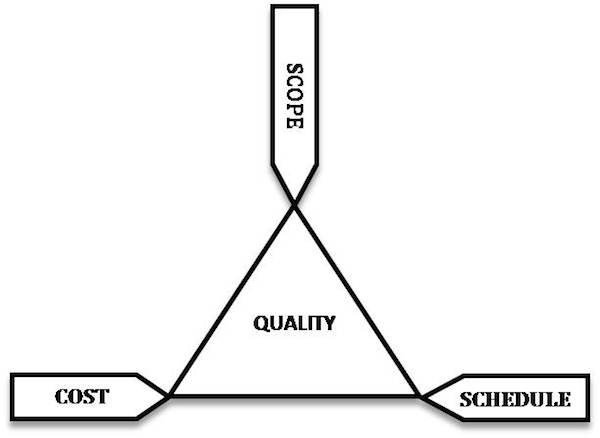Working with Project Managers
Technical people often have problems with Project Managers. It doesn’t have to be this way though - if you can each recognise the other’s strengths and weaknesses, you can work well together. Here’s some advice on working with PMs.
I’ve worked with many project managers over the years. I don’t get on with them all, but I’ve been fortunate enough to work with some really good PMs, who made a real difference to the project. Yes, they do exist. To have a mutually beneficial relationship, it helps to know what motivates a PM, what they’re good at, and what they’re not good at. Then you get can get them to work for you. Remember that they’re not your boss - they’re another resource helping to get the project done.
What Motivates a PM?
Project Managers worry about three things: Scope, Cost and Schedule. This can be represented as the Project Management Triangle:
Source http://en.wikipedia.org/wiki/File:The_triad_constraints.jpg
They know that changes to any one side will affect the others. If the Scope is increased, it will raise the Cost, and/or push out the Schedule. Similarly, if there is an arbitrary Schedule, the PM will be trying to work out how to reduce Scope to meet that date.
What Do Project Managers Do?
Project Managers track anything that affects the Scope/Cost/Schedule - either direct impact (ie an Issue), or a possible impact (a Risk). They want to know what work is being done (the Scope), who is doing it and when it will be done (the Schedule), and how much it costs (the Cost). They want to collate this information from people like you, and feed it up to the project sponsor.
They have various ways of tracking this - Gantt charts, RAID logs, status reports, etc. The ‘how’ is less important than the ‘what’.
Because of the nature of what they do, they should be very good at communicating with people, performing administrative tasks, and documentation.
What Don’t They Do?
- They don’t make technical decisions. They may help make decisions on the best approach based on risk/time/cost, but they are not equipped to make technical decisions.
- They are not people managers. Don’t expect them to care about your personal growth. They only care about their project.
- They don’t care about Operational matters. They want to get their project completed, and get out.
So How Can we Work Together?
These are my key guidelines for working together well:
- Keep them well-informed of anything that could impact their Scope/Cost/Schedule. Tell them early. Tell them often. This keeps them happy. Remember: They’d rather know ASAP about any Risks/Issues, than have it come up later, and impact the sacred Scope/Cost/Schedule.
- Use them for what they’re good at. Being held up by people not giving you information? Pass it to the PM to chase it up. Need some random project administrative task taken care of? Push it to the PM. Need someone to organise a room, food, drinks, and get 20 people transported there? PMs are perfect at getting this done. Sometimes I think of PMs as performing a secretarial role.
- Don’t let them make technical decisions. This is a tricky one, but it causes the most strife in projects. Engineers (myself included) are guilty of presenting too many options, and not making clear recommendations. We need to briefly outline options, and make a clear recommendation. If you are unsure, then frame the options in terms of risk/time/cost. Get the PM to help with you decisions around that, not around which choice is technically better.
Establish these roles and boundaries early on, and things can go well. Mess it up, and you end up in a horrible project, with endless finger-pointing, wasted time & effort on pointless meetings, and poor decision-making. Then no-one feels good about getting the project completed.
